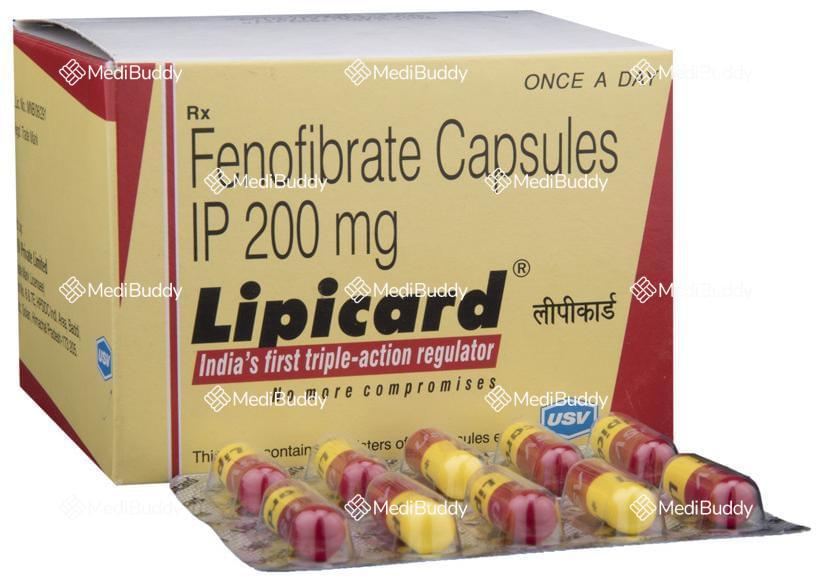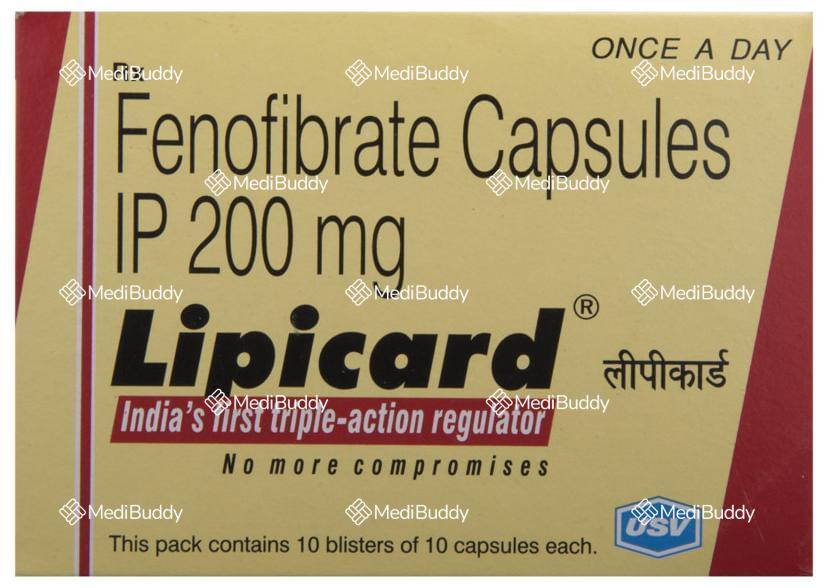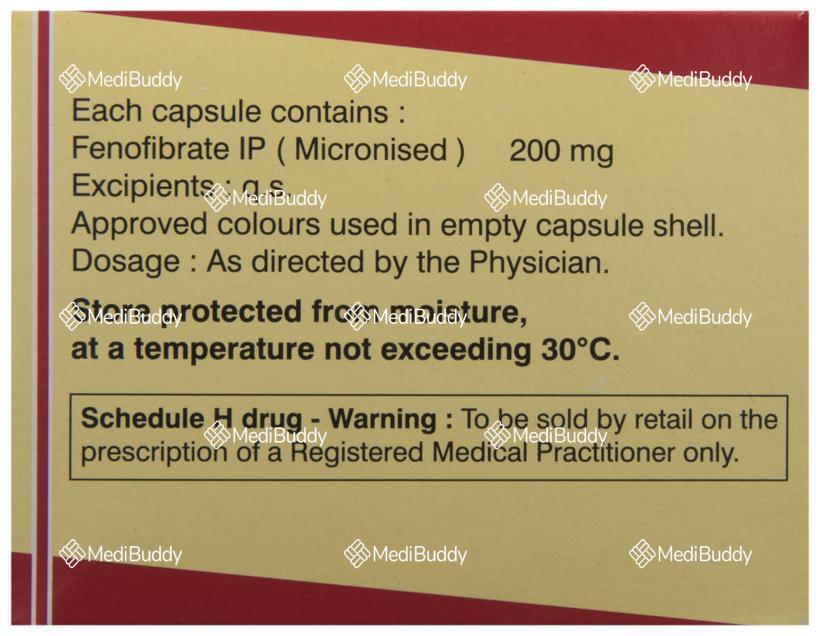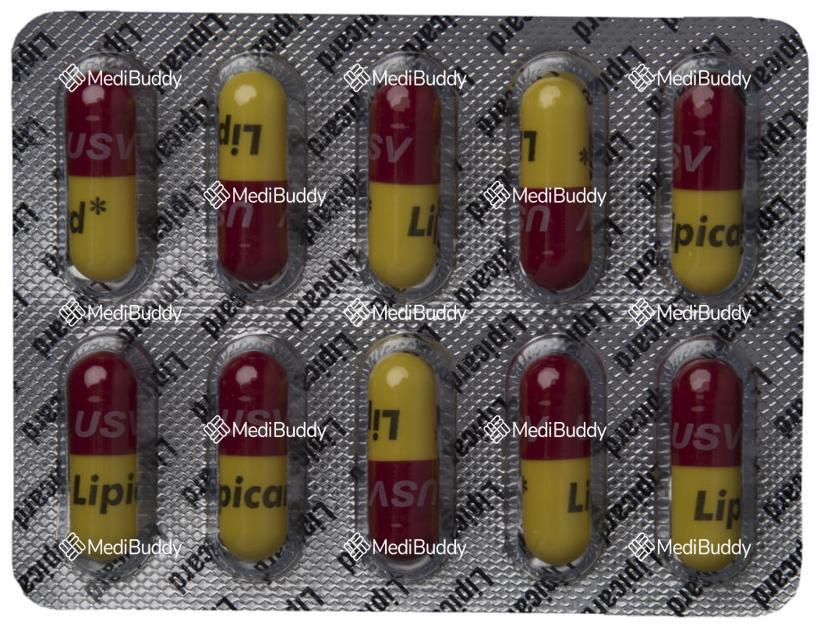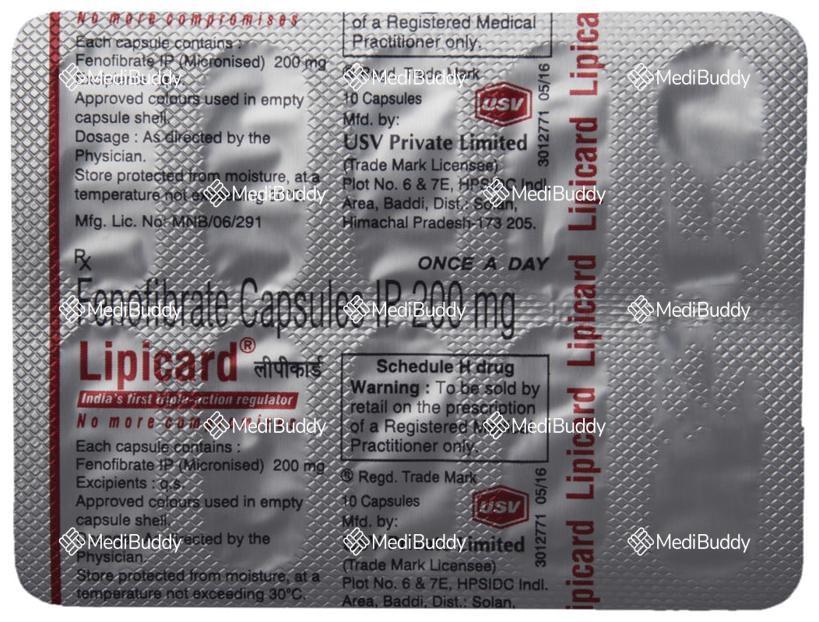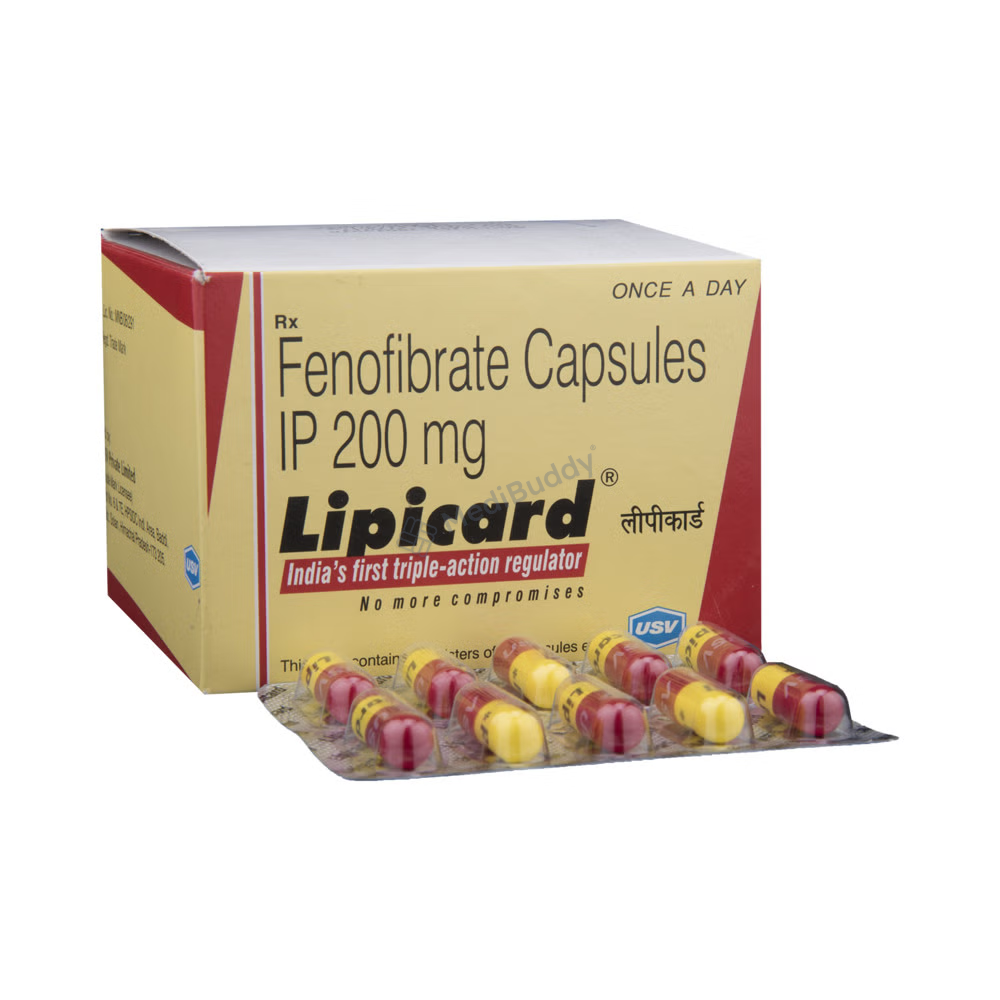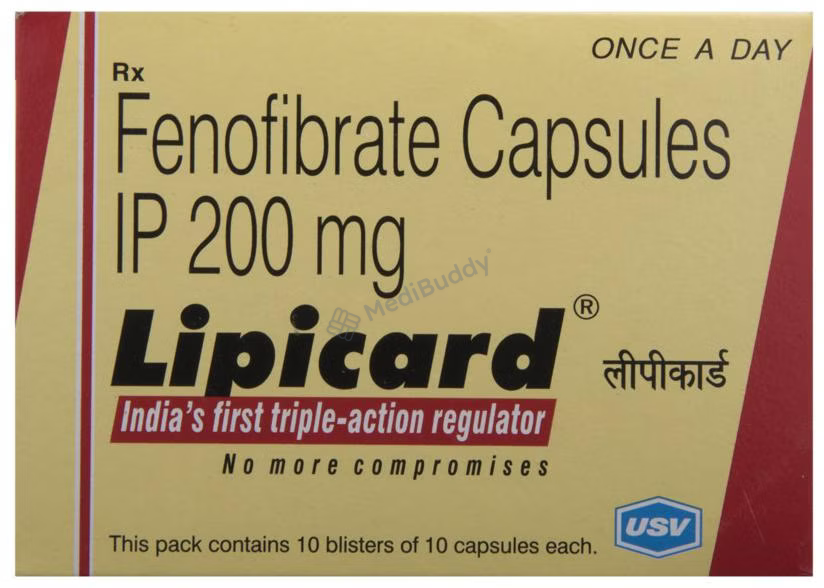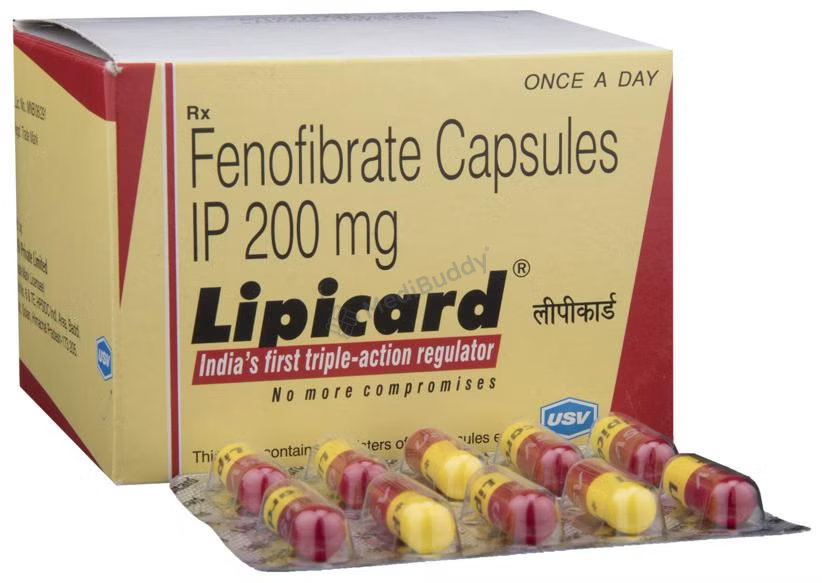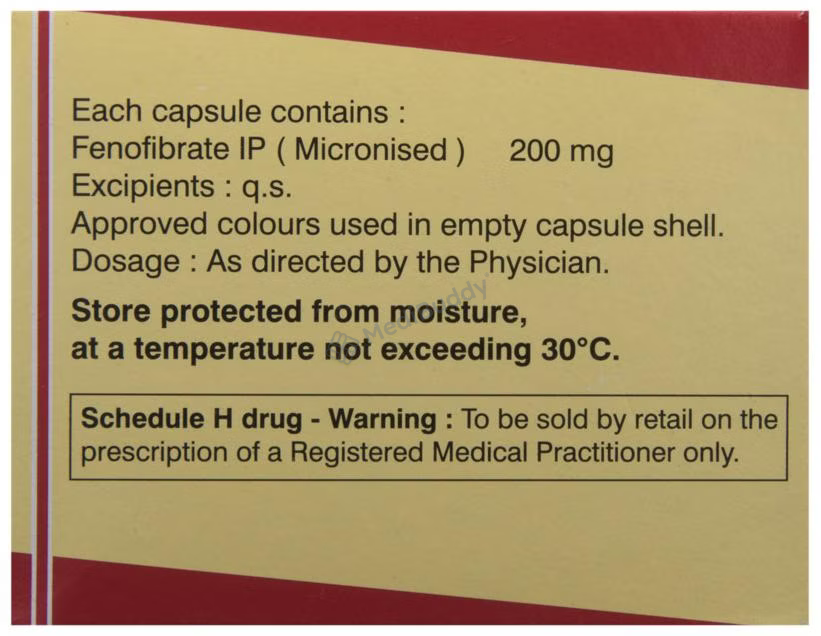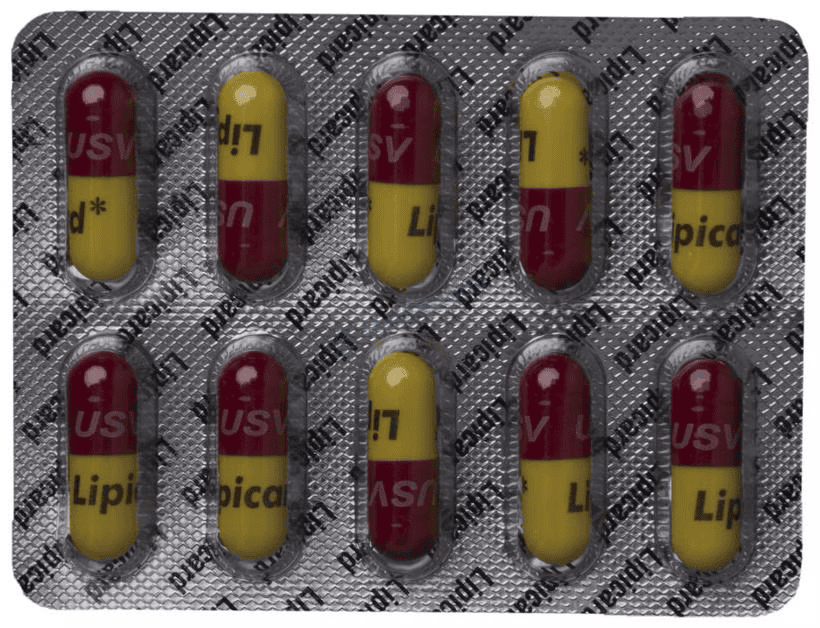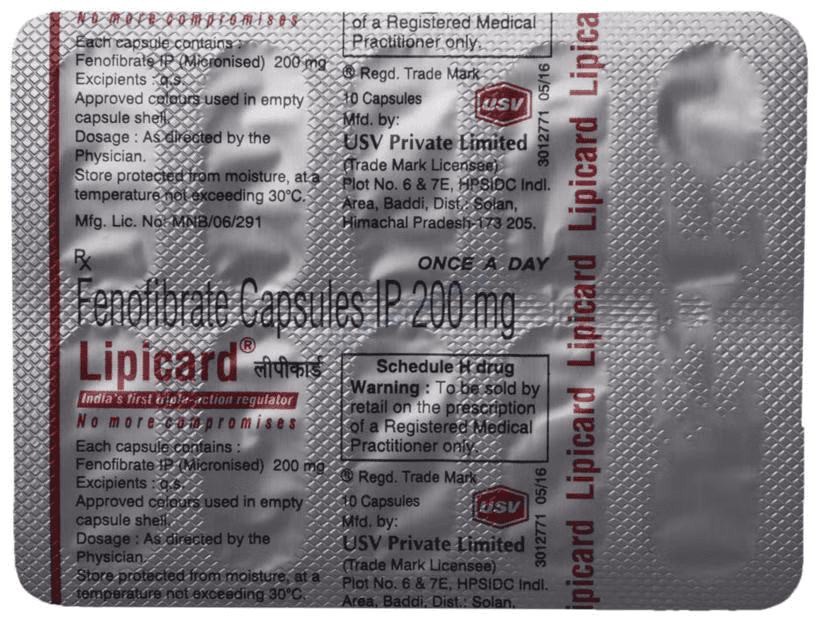Lipicard Capsule
By Lipicard
Rx
10 Capsule in a Strip

Composition
Fenofibrate(200mg)

Manufacturer - USV Ltd
Arvind Vithal Gandhi Chowk, BSD Marg, Station Road, Govandi East, Mumbai - 400 088. , India.

Expires on or after
April, 2026
About Lipicard Capsule
Lipicard Capsule is a type of medicine used to help manage high cholesterol levels in the body. This medication works by lowering the levels of triglycerides and "bad" cholesterol (LDL), while simultaneously increasing the levels of "good" cholesterol (HDL). By doing so, it plays a vital role in reducing the risk of heart attack and stroke, which are often linked to elevated cholesterol levels.
It is essential to take Lipicard Capsule according to the dosage and duration prescribed by your doctor. While you can take it with food at any time of the day, it is advisable to maintain consistency in the timing of your doses. Even if high cholesterol does not typically cause noticeable symptoms, discontinuing the medication could lead to worsened conditions, such as a rise in cholesterol levels and an increased risk of heart-related issues. Therefore, regular monitoring of cholesterol levels is crucial.
Lipicard Capsule is not a standalone solution; it is part of a comprehensive treatment approach that should also incorporate a balanced diet, regular physical activity, quitting smoking, limiting alcohol consumption, and weight management. Although you can maintain your normal diet while using this medicine, it is recommended to avoid fatty foods. Be aware that common side effects may include nausea, abdominal pain, diarrhea, and vomiting. Inform your doctor about any other prescribed medications you are taking, especially if you have kidney or liver issues.
Advisable actions to enhance the efficacy of the treatment may include engaging in a low-fat diet rich in fruits, vegetables, and greens, along with regular exercise, quality sleep, stress management, and avoiding alcohol and smoking. While Lipicard Capsule can significantly benefit many individuals, it is important to note that precautions should be taken. This medication may cause rare side effects such as muscle pain or weakness, kidney damage, and should be used cautiously in patients with certain conditions, including pancreatitis, underactive thyroid, and liver or kidney diseases.
Lastly, it is crucial to avoid using Lipicard Capsule during pregnancy, breastfeeding, or in individuals below 18 years old, unless specifically advised by a healthcare professional. Always seek guidance from your doctor before starting or discontinuing the use of this medication to ensure optimal results and minimize potential risks.
Benefits
Lipicard Capsule offers effective benefits in managing high cholesterol levels in the body. By reducing cholesterol, this medication helps to lower the risk of heart diseases and promotes overall health and well-being. It contains fenofibrate, which works in conjunction with a balanced diet to decrease "bad cholesterol" (LDL and triglycerides) while increasing "good cholesterol" (HDL) in the bloodstream. When used consistently and coupled with healthy lifestyle choices such as proper nutrition and regular physical activity, Lipicard Capsule maximizes its efficacy. Additionally, this medication can be used in combination with statins to further lower cholesterol levels. Moreover, Lipicard Capsule is beneficial for individuals with diabetes and high blood pressure who have elevated cholesterol levels. It is important to continue taking Lipicard Capsule as prescribed, even if you start feeling better, to maintain its positive effects on cholesterol levels and overall heart health.
How to use the Lipicard Capsule
To properly use Lipicard Capsule, it is essential to follow your doctor's instructions regarding the dosage and duration. Remember to take this medication with food to minimize any potential stomach upset. Swallow the capsule whole with a full glass of water; do not crush, break, or chew it as this may alter its effectiveness. Following these instructions will help ensure that you receive the maximum benefit from Lipicard Capsule.
Uses of Lipicard Capsule
Lipicard Capsule is commonly used to help manage high cholesterol levels in the body. High cholesterol, also known as hyperlipidemia, can increase the risk of heart disease and other serious health issues. By taking Lipicard Capsule as prescribed, individuals can work towards lowering their cholesterol levels and improving their overall health. This medication is specifically designed to target and reduce high levels of cholesterol, providing a valuable tool in maintaining a healthy lifestyle.
What conditions Lipicard Capsule treats?
Lipicard Capsule helps in managing hyperlipidemia, a condition characterized by high levels of cholesterol in the blood. Cholesterol, a type of fat, is essential for the body but excess amounts can accumulate on the walls of blood vessels, forming plaques and leading to clogged arteries. This can increase the risk of heart attack and stroke. Lipicard Capsule works to regulate cholesterol levels, reducing the likelihood of these serious complications associated with hyperlipidemia.
Should you consult a doctor?
Seek your doctor if you experience persistent side effects like nausea, vomiting, abdominal pain, or diarrhea. If you have concerns about side effects, consult your doctor. Additionally, if you notice increased liver enzymes or any unusual symptoms, it's important to seek medical advice. Pregnant or breastfeeding women should consult a doctor before taking Lipicard Capsule. If you have kidney or liver disease, use this medicine cautiously under medical supervision. Remember, stopping this medication without guidance can lead to a worsening condition. Regularly check your cholesterol levels and inform your doctor about any medications you are taking. Remember to adhere to a healthy lifestyle including diet, exercise, and avoiding high-fat foods for overall effectiveness of the treatment program.
Side effects of Lipicard Capsule
When taking Lipicard Capsule, it is important to be aware of potential side effects that may occur. Most of these side effects are temporary and should improve as your body gets used to the medication. However, if any side effects persist or cause concern, it is recommended to consult your doctor promptly. Common side effects of Lipicard Capsule include increased liver enzymes, nausea, vomiting, flatulence, abdominal pain, diarrhea, headache, back pain, and increased creatine phosphokinase (CPK) levels in the blood. Additionally, some individuals may experience inflammation of the nose, muscle pain, stuffy or runny nose, joint pain, and headaches. Monitoring these potential side effects and discussing any concerns with your healthcare provider can help ensure a safe and effective treatment experience.
Safety advice

liver
Lipicard Capsule should be avoided by patients with liver disease as it is considered unsafe for them. It is not recommended for those with severe liver conditions. Please talk to your doctor before using Lipicard Capsule if you have liver issues.

kidney
When using Lipicard Capsule, it's important to be cautious if you have kidney disease. Your doctor may need to adjust the dose accordingly. Avoid using this medication if you have severe kidney disease. Remember to consult your doctor for proper guidance.

alcohol
It is not safe to drink alcohol while taking Lipicard Capsule.

driving
Lipicard Capsule typically doesn't impact your driving ability.

pregnancy
Lipicard Capsule is not recommended during pregnancy. Animal studies suggest potential harm to the baby. Consult your doctor to evaluate risks versus benefits before using.

breastfeeding
Caution should be taken while breastfeeding, as Lipicard Capsule may not be safe. Limited data shows the drug could pass into breastmilk and potentially harm the baby.
Consumption warning before consuming Lipicard Capsule
Before consuming Lipicard Capsule, it is crucial to inform your doctor about any allergies or hypersensitivity reactions to medications or food. Additionally, disclose if you have issues with your bladder, gallstones, liver, kidneys, or muscles (such as muscle pain or rhabdomyolysis). If pregnant or breastfeeding, consult your doctor to assess the benefits and risks. Keep your doctor updated on your health status and current medications to prevent potential side effects. Avoid alcohol to minimize the risk of dizziness. Lipicard Capsule is not suitable for individuals under 18 years old.
What if you forgot to take Lipicard Capsule?
If you forget to take a dose of Lipicard Capsule, try to take it as soon as you can. But if it's close to the time for your next scheduled dose, it's best to just skip the missed one and continue with your normal dosing routine. Avoid taking extra doses of Trifeno to make up for the missed one.
Related lab tests
When taking Lipicard Capsule, it is important to monitor certain lab tests to ensure the medication is working effectively and not causing any adverse effects. The related lab tests for Lipicard Capsule include Cholesterol - HDL, Cholesterol - LDL, and Cholesterol - Total. These tests help in evaluating the levels of different types of cholesterol in the blood, which are important indicators of heart health.
Cholesterol - HDL, or high-density lipoprotein cholesterol, is often referred to as "good" cholesterol as it helps remove other forms of cholesterol from the bloodstream, reducing the risk of heart disease. Cholesterol - LDL, or low-density lipoprotein cholesterol, is known as "bad" cholesterol as high levels can lead to plaque buildup in the arteries, increasing the risk of heart disease. Cholesterol - Total refers to the overall cholesterol levels in the blood and is used as a general indicator of heart health.
Monitoring these lab tests while taking Lipicard Capsule can help healthcare providers assess the impact of the medication on cholesterol levels and make any necessary adjustments to treatment plans. It is essential to follow up with your healthcare provider for regular testing and to discuss the results to ensure the best possible outcomes for your heart health.
Additional Information
| Habit Forming | No |
| Chemical Class | PPAR alpha |
| Therapeutic Class | - |
| Action Class | PPAR alpha agonists (Fibrate) |
FAQs
Disclaimer
The information provided on this website is to the best of our abilities to ensure it is accurate, reliable, and reviewed by a team of professionals. It should not be used to diagnose, prevent, or cure any health problem. The information presented here is not intended to create a doctor-patient relationship or replace a registered medical practitioner's advice, diagnosis, or treatment. The absence or provision of any information or warning regarding any medicine should not be assumed as an implied or explicit assurance of safety or efficacy. We highly recommend consulting your registered medical practitioner for all queries or doubts related to your medical condition. Do not ignore professional medical advice or delay seeking it based on the content encountered on our website. We intend to support, not replace, the doctor-patient relationship.
₹240.84
₹267.6
10% OFF
Inclusive of all taxes
Content verified by

Dr. Abdullah Khan
MBBS - General Medicine
Last update on 01-Oct-2024
